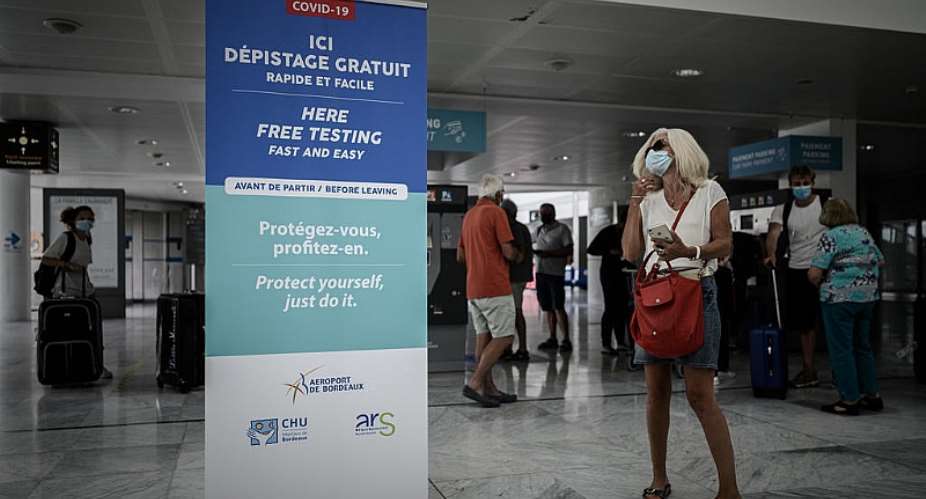France has recorded more than 1,000 new cases of coronavirus in 24 hours. As concern grows over the number of “hotspots” the government is to announce new measures on Friday to try and keep a potential second wave at bay.
While death rates and the numbers of hospitalised patients remain low in France, there is growing concern over the sharp rise in new cases.
On Thursday, more than 1,000 new cases of Covid-19 were recorded over the previous 24 hours, according to the latest data from Santé Publique France (SPF).
This marks a sharp increase on the previous week, which saw some 500 new cases recorded per day.
Overall, there's been a 26 percent increase in the number of new cases in a week.
Health authorities say this is not due to the widespread testing programme which, according to health minister Olivier Véran, is currently running at around 400,000 per week, but suggests it could mark the beginning of a new wave.
The transmission of the virus is "increasing for the third consecutive week" SPF noted in Thursday's bulletin. Most worryingly, "the increase in the number of new cases is greater than the number of patients tested".
Fear over a second wave
Many of the new cases are being reported in so called 'hotspots' including in south west France, Brittany and Mayenne which had been relatively unaffected up til now.
10 new clusters of cases have been identified over the last 24 hours, bringing the total number to 209.
The numbers are increasing as people head off on holiday and have more family reunions.
According to an Odoxa opinion poll conducted for Le Figaro newspaper, published Wednesday, the French are more worried about the prospect of a second wave of infections (66 percent), ahead of insecurity (35 percent) and terrorism (29 percent).
People are being encouraged to get tested for the virus before heading off on holiday.
But the government recognizes there is “bottleneck” in labs in the Ile-de-France region with staff shortages due to holiday leave.
The average number of tests in France per week, currently around 400,000, is well below the 700,000 originally planned.
Jean-François Delfraissy, head of the scientific council, admitted the waiting time for getting appointments was “too long, and could be better”. He himself had had to wait six days to get tested, he told Le Monde.
- France flags scores of active Covid-19 clusters but 'no signs of second wave'
- France's neighbour, Belgium, tightens COVID-19 measures as infections spike
- Paris region to roll out mass Covid-19 testing to track down 'possible dormant clusters'
- Face masks become compulsory in France – but where must you wear them?
“New measures” to be announced
A council of defense is meeting at the Elysée on Friday to discuss a raft of new measures to contain the spread of the virus.
On Monday, France made the wearing of masks compulsory in enclosed public spaces, and some towns such as La Rochelle, Argelès-sur-mer, and Cannes have also made them compulsory on some streets. The government could decide to extend that measure more broadly.
Health minister Olivier Véran has promised 40 million masks would be distributed to people in need.
The council will also be reflecting on whether to re-introduce restrictions on border crossings with France's neighbours, after Belgium saw a spike in new infections and Spain put some towns, particularly in Catalonia, into lockdown.
“Absolutely nothing is ruled out. The only aim is to protect French people,” said government spokesperson Gabriel Attal on Wednesday.
Prime minister Jean Castex said he was “following the situation in Spain very closely”.
Speaking on TF1 television on Tuesday President Macron seemed to reject the option of closing the border with Spain and congratulated “the good organisation and cooperation” between Europeans.
Macron favours a mix of measures including being “tested in your country of origin” or “tested on arrival in France” or a “policy of follow-up and quarantine”.
The French government has said it will not put the country back into a nationwide lockdown. But it is working on a plan for localised lockdowns in areas where there is a spike in the number of cases.





 SSNIT must be managed without gov’t interference – Austin Gamey
SSNIT must be managed without gov’t interference – Austin Gamey
 Ejisu by-election could go either way between NPP and independent candidate — Gl...
Ejisu by-election could go either way between NPP and independent candidate — Gl...
 We never asked ministers, DCEs to bring NPP apparatchiks for returning officer r...
We never asked ministers, DCEs to bring NPP apparatchiks for returning officer r...
 No one denigrated the commission when you appointed NDC sympathizers during your...
No one denigrated the commission when you appointed NDC sympathizers during your...
 Used cloth dealers protests over delayed Kumasi Central Market project
Used cloth dealers protests over delayed Kumasi Central Market project
 A/R: Kwadaso onion market traders refuse to relocate to new site
A/R: Kwadaso onion market traders refuse to relocate to new site
 Dumsor: Corn mill operators at Kaneshie market face financial crisis
Dumsor: Corn mill operators at Kaneshie market face financial crisis
 Jamestown fishermen seek support over destruction of canoes by Tuesday's heavy d...
Jamestown fishermen seek support over destruction of canoes by Tuesday's heavy d...
 Election 2024: EC to commence voter registration exercise on May 7
Election 2024: EC to commence voter registration exercise on May 7
 Public schools rebranding: We’re switching to blue and white, we’re painting all...
Public schools rebranding: We’re switching to blue and white, we’re painting all...
